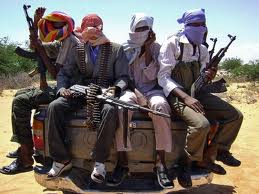The say you do not choose who your neighbors are, there is no doubt however that Somalia is as a bad as a neighbor can get. As a young boy I remember seeing on a black and white TV the grotesque images of Dan Eldon, Antony Macharia and Hos Maina, three Kenyan photojournalists being flown from Somalia in body bags. I have associated Somalia with dread ever since that time and for the quarter decade that I have been around Somalia indeed has been a dreadful country. Earlier this week the figures coming out of Somalia suggested nearly 260,000 people died between October 2010 and April 2012. The figures are mind boggling, a big red blot on the world’s humanitarian community. If you are looking for a failed state, Somalia is as failed a state as you would get.
Within the last year 12 journalists were murdered in Somalia, 46 aid workers were killed and there were 87 incidences of kidnappings. According to the UNHCR Somalia, there are an estimate 1.55 million Internally Displaced Persons and around 500,000 registered refugees in neighboring countries. The 500,000 registered refugees is conservative, undocumented refugees arrive in Kenya in their droves. Any statistic that comes from Somalia gives the world creeps. We cringe at the figures of death, a new urgency of purpose is created, but there is very little evidence that the figures and the number have a humanizing effect.
The second Somalia conference has just ended in Somalia with promises of more than 380 million US$D in aid to the Somalia yet the images of bullet buildings in Mogadishu, Kismayo or any other Somali town only tell half the story. As is so often the case the human cost of the state paralysis that has bedeviled Somalia for the last 2 decades is often relegated to the periphery. There are many undocumented Somali’s in Kenya, to get here some had to go through the most perilous odysseys. Yet the now functionally stateless Somalis in Kenya have found nothing but suffering and at times xenophobia in this country.
The brunt of the humanitarian crisis in Somalia lays its weight heavily and squarely on Kenyan society like a mallet of lead. In Nairobi’s Eastleigh area, where most Somalia refugees and undocumented immigrants set up base, social conditions are deplorable, the roads impassable and the people with a certain angst to have and make a better life for themselves but irreparably enfeebled to do so.
Eastleigh is a frictional place, where cultures clash, social classes clash as well ideas. Since people of Cushitic origin are phonotypically different from a bulk of many other Kenyan communities, picking them out for has always been as easy as pie. People of Cushitic origin; be they Somali’s from Somalia or Somali’s from Kenya have oft times been subject to arbitrary police round ups and brutality. That is why Eastleigh is seen by most in government as a habitable breeding place for fundamentalists in Kenya. Between the months of August and December last year over six hundred suspects had been taken in for questioning by government forces, and some have suffered rendition too.
The Somali problem though requires a home-based solution and by home-based I mean a solution that births and comes from Somalia itself. The skepticism I have seen ensue from any bid that seeks to patch up Somalia and her problems is enormous that is why the international community and neighbouring countries like Kenya must not be manifestly involved in proffering solutions for the Horn of Africa country but rather provide institutional support and strengthening for Somalia to get herself out of the dust by herself.
The International community has bottle-fed Somalia for so long, and therein lies the problem, the more money and food aid that Somalia begets the more uninspired her people will be to change their situation. To much aid enfeebles communities and social institutions.
At times, most times in fact, the ignobility of members of the humanitarian community works to negate the noble goals and intentions to halt the exacerbation of poverty, hunger and famine in Somalia. Massive kleptocracy means that those directly involved would not want the conflict to end as they want to continue extracting cheap aid sleaze from aid.
Those who are trying to resuscitate Somalia should stop looking at Somalia as one unified macro-political unit because Somalia might as well be served better if she fragments and Balkanizes into smaller political and administrative units, probably along the folds of the Balkans fragmentation in the 1990s.



